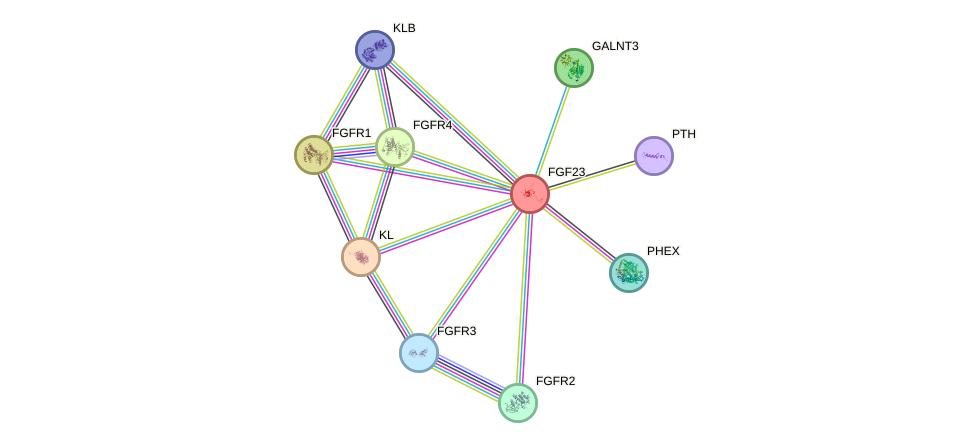GenAge entry for FGF23 (Homo sapiens)
Gene name (HAGRID: 259)
- HGNC symbol
- FGF23
- Aliases
- Common name
- fibroblast growth factor 23
Potential relevance to the human ageing process
- Main reason for selection
- Entry selected based on evidence showing that the gene product to be a target of genes previously linked to ageing
- Description
FGF23-null mice have a short lifespan and develop features resembling premature ageing. This appears to be a vitamin D-mediated process similar to that observed in klohto (KL) mice [1853]. KL has been shown to be an essential cofactor for activation of FGF signaling by FGF23 [1851]. Though inconclusive at present, FGF23 might play some role in ageing.
Cytogenetic information
- Cytogenetic band
- 12p13.3
- Location
- 4,368,227 bp to 4,379,728 bp
- Orientation
- Minus strand
Protein information
- Gene Ontology
-
Process: GO:0000165; MAPK cascade
GO:0008543; fibroblast growth factor receptor signaling pathway
GO:0010966; regulation of phosphate transport
GO:0010980; positive regulation of vitamin D 24-hydroxylase activity
GO:0014066; regulation of phosphatidylinositol 3-kinase signaling
GO:0018108; peptidyl-tyrosine phosphorylation
GO:0030154; cell differentiation
GO:0030502; negative regulation of bone mineralization
GO:0030643; cellular phosphate ion homeostasis
GO:0032026; response to magnesium ion
GO:0036092; phosphatidylinositol-3-phosphate biosynthetic process
And 16 more GO terms Cellular component: GO:0005576; extracellular region
GO:0005615; extracellular space
GO:0005796; Golgi lumen
Show all GO termsFunction: GO:0004713; protein tyrosine kinase activity
GO:0005088; Ras guanyl-nucleotide exchange factor activity
GO:0005105; type 1 fibroblast growth factor receptor binding
GO:0008083; growth factor activity
GO:0016303; 1-phosphatidylinositol-3-kinase activity
GO:0046934; phosphatidylinositol-4,5-bisphosphate 3-kinase activity
Protein interactions and network
Retrieve sequences for FGF23
Homologs in model organisms
In other databases
- GenAge model organism genes
- A homolog of this gene for Mus musculus is present as Fgf23

